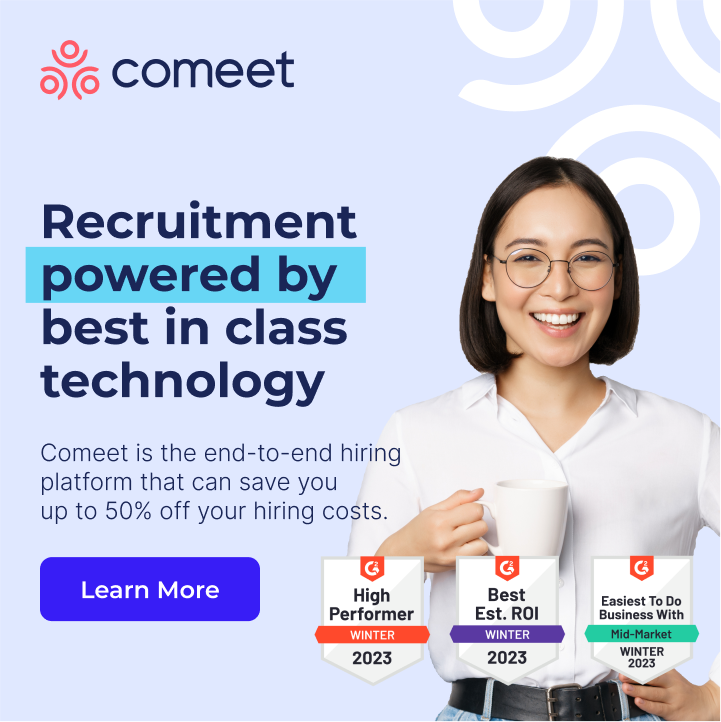In this article, we’ll cover why professional recruiters are critical to your company’s success, the different options available, and how to determine which of these options is the right method to go about hiring a recruiter for your startup.
Hiring a recruiter for your startup is an inevitable step when scaling a team. Recruiting on your own is fine when you’re just getting started, but if your company is ready to reach the next level, you’ll need someone with specialized experience in sourcing top talent. You need a recruiter.
Ask yourself 4 questions before hiring a recruiter
Before you officially bring on a recruiter, Mikaela Kiner, CEO of Reverb, a management and HR consulting company suggests asking yourself the following questions to determine whether it is in fact the right time for hiring a recruiter, and why.
How early-stage are you?
As Kiner explains, “If you’re making your first hires and don’t know how much more you’ll need to grow and whether you’ll get more funding, it might be too early to bring on someone unless they’re fractional.” You don’t want to make a long-term investment in an employee who will have little to do after the initial hiring peak ends.
Is recruiting taking time away from your core job functions, and if so, what could you accomplish if you didn’t have to handle recruiting?
A recruiting solution might free up time to focus on any number of departments and initiatives including sales, product development, and marketing.
Is this a full-time ongoing role?
Will you need to hire multiple new roles over a long period of time, or will you need to hire for just one or two positions, and only on an as-needed basis? Your answer will determine whether to hire an in-house recruiter or choose from among the outsourcing options, which we’ll discuss below.
Do you have time to train someone and provide day-to-day guidance?
If you don’t, an in-house recruiter will be a lot of extra work without much payoff. While outsourcing your hiring will incur time and money costs up front, once your recruiter has the information they need, they can be fairly autonomous. Plus, you can decide whether the relationship should be ongoing or time-bound only for specific hiring needs.
Choose the recruiting solution that’s right for you
Once you’ve answered the previous and determine it’s time to hire a recruiter, you’ll need to choose which type. Below are three popular options.
In-house Recruiting
An in-house recruiter is a (usually) full-time employee responsible for sourcing, contacting, screening, interviewing, and hiring job candidates for a company. They work in collaboration with each team or department to determine how and when to fill open roles. Depending on the size of the company, one person might do so for the entire company, or just for one team or department.
Pros: Because they are on staff, it’s an in-house recruiter’s job to know the company inside and out, and have the kind of institutional knowledge of the mission, culture, and goals that other solutions might not. Jean Gregoire, Founder and CEO of Lovebox told Comeet, “We chose to use an in-house recruiter because our company culture is very important to us, and we felt that someone in-house would have a better understanding of what it takes to be successful at our company.”
Cons: In-house recruiters are a long-term investment, in both money and time. Early stage startups in particular should consider whether they have the following: the budget for a full-time employee focused solely on hiring, the time necessary to integrate them into the company, and most importantly, how many hires you actually need to make, and over what timeframe. If you only need to hire one or two new staff members at a time, you risk spending your budget on an employee who has little to do after the hiring peaks are over. Top recruiters are also in high demand; consider waiting to hire an internal recruiter until your company has achieved higher growth and scale in order to stay competitive and attract the best possible candidates.
Recruitment Process Outsourcing (RPO)
RPO involves outsourcing all or part of your recruiting process to an outside firm, including developing job postings, sourcing candidates, creating interview processes, and eventually interviewing candidates and even making hires (full-cycle RPO). You might also opt for a partial-cycle, where the RPO sources, screens, and refers candidates, and your company handles the rest of the interview and hiring process.
Pros: RPOs come ready with defined hiring processes and candidate pools that are just as deep as traditional recruitment agencies, but better tailored to your sector and company’s specific needs. They’ll also handle all of the job advertising and candidate outreach.
Cons: RPOs are expensive, better suited to late-stage startups that need to hire for multiple positions and have the budget to hire a recruiter, but not the time to invest in training an in-house one. if you choose the RPO route, you’ll need to invest time as well as money upfront to ensure you trust the RPO provider, which is difficult for early stage companies.
Recruiting Agencies
Another type of outsourced recruiting, agencies work with companies to place qualified candidates in open positions. They do so fast, and generally for temporary job needs, though some agencies specialize in temp to permanent and permanent hires. Their advantage is volume and speed; the bigger agencies have a wider pool of candidates to work with and suggest for your review.
Pros: Recruiting agencies are great in a pinch, especially if you need to hire temporary staff, fast. The larger companies also generally have large candidate pools, so you’ll have a wide range of candidates to choose from that you might not otherwise have in your own internal networks.
Cons: Since these agencies typically get paid to place candidates, it’s in their best interest to do so quickly, resulting in a rushed process that doesn’t leave time for thorough vetting. Also, while some agencies may specialize in particular fields, resulting in better candidate matches, others may be too broad, resulting in less than ideal hires.
Elastic Recruiting
Why elastic is the best choice for hiring your first recruiter
If none of the above recruiting solutions are right for your company, there’s a flexible and dynamic option for hiring your first recruiter. It’s called Elastic Recruiting. Elastic recruiting is the best of all possible recruiting worlds, providing the capacity and speed of an on-demand option, with the deep industry knowledge and technical expertise of an RPO or consultancy.
When using Elastic Recruiting, you’ll work with a designated talent acquisition strategist who serves as your company’s head of recruiting if you don’t have a department, or act as a reliable and expert extension of your own team. Your strategist will work with your team and align with your hiring goals to source, screen, schedule, and interview candidates, all tracked in a single, easy-to-use platform. Candidates in the pipeline are yours to retain, and the tech is not an additional fee.
Hiring a recruiter can be tough, but we’re here to make it easier for you. It’s also easy to scale up or down depending on your hiring needs, unlike an in-house recruiter who remains on your payroll even after hiring peaks, or an RPO whose costs are generally higher than the average early-stage startup can afford and might require longer-term contracts. Elastic Recruiting is just that: flexible enough to be configured to your specific needs. Hiring a recruiter is an important decision, contact our friendly team of talent acquisition experts for a consultation around the elastic method of recruitment.
Related Resources
Need help with your talent acquisition & recruitment?
Learn More: Comeet Elastic Recruiting
Your Startup Scaling your Hiring in 2022?
Get Your Guide: The Ultimate Guide for Hiring to Scale Quickly
Is Your ATS tech hindering your recruiting goals?
Get Your Guide: Choosing an ATS for high-growth companies.
Do you know the myths from the facts on scaling startup hiring today?
Get Whitepaper: The New Startup Scalability Superpower

































